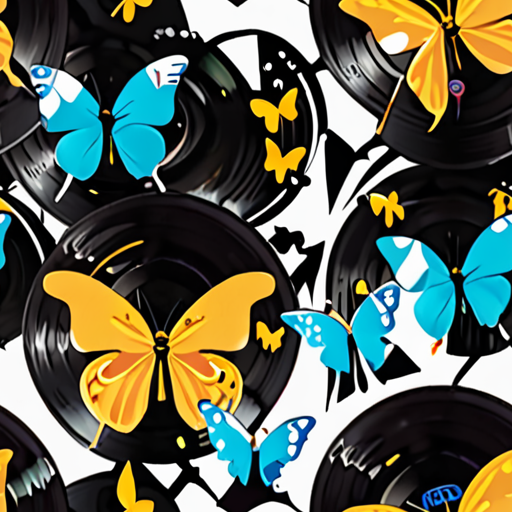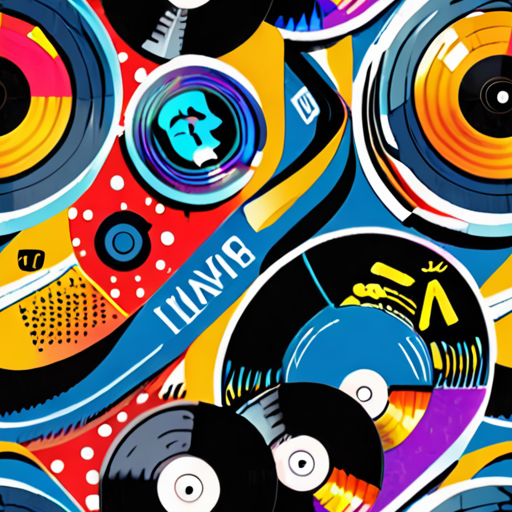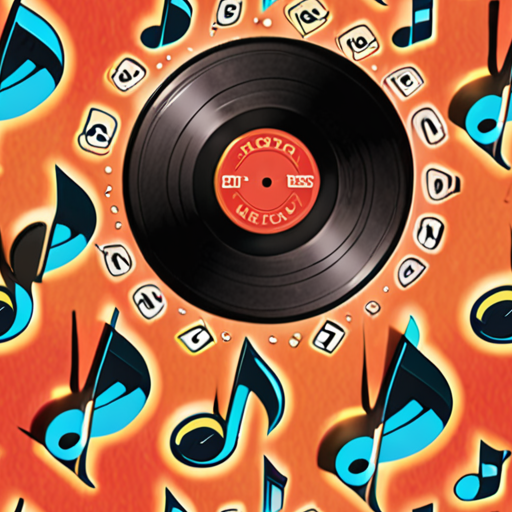For aspiring musicians and music enthusiasts alike, navigating the ever-evolving landscape of music review blogs can be a daunting task. With countless options available, it’s essential to understand which platforms offer the most valuable exposure and how to leverage them to boost your career. In this comprehensive guide, we’ll delve into the world of music review blogs, exploring the top sites to follow, strategies for getting featured, and the latest trends shaping the industry.

The Best Music Review Site
We’re often asked which music review site stands out from the rest, and our answer is simple: it depends on what you’re looking for.
- AllMusic : With a vast database of music reviews, AllMusic is a great resource for anyone looking for in-depth analysis of various genres. Their reviews feature critic and user ratings, making it easy to find the perfect album or artist.
- Pitchfork : Pitchfork is known for its insightful and well-written reviews, covering a wide range of genres from indie rock to electronic music. Their website features a user-friendly interface and a robust archive of past reviews.
- NME : NME (New Musical Express) has been a leading music publication for decades, offering in-depth reviews and interviews with top artists. While they’ve undergone significant changes in recent years, their website remains a valuable resource for music enthusiasts.
- Rolling Stone : As one of the most iconic music publications, Rolling Stone offers a wealth of reviews, interviews, and features on various artists and genres. Their website features a clean design and easy navigation, making it a great destination for music lovers.
Of course, these are just a few examples of the many excellent music review sites out there. Ultimately, the “best” site will depend on your personal preferences and interests. At Oedipus Band , we strive to provide high-quality content and reviews that cater to our audience’s diverse tastes.
Why Choose Oedipus Band?
As a music blog dedicated to rock enthusiasts, we offer a unique perspective on the music scene. Our team of writers and contributors bring a wealth of knowledge and passion to our reviews, ensuring that our readers receive the most accurate and engaging content possible.
Key Features:
- Exclusive Interviews : We regularly feature in-depth interviews with top artists and bands, giving our readers a glimpse into the creative process and behind-the-scenes stories.
- Music Reviews : Our reviews cover a wide range of genres, from classic rock to contemporary indie and alternative. We aim to provide balanced and honest assessments of albums and live performances.
- Tips for Emerging Artists : As a platform for aspiring musicians, we offer advice and guidance on how to succeed in the music industry. From songwriting tips to marketing strategies, our content is designed to inspire and educate.
At Oedipus Band , we’re committed to delivering high-quality content that resonates with our audience. Whether you’re a seasoned music enthusiast or just discovering your favorite genre, we invite you to explore our website and join the conversation.
Becoming a Music Reviewer
To become a music reviewer, I’ve found that formal education in journalism, communications, English, writing, creative writing, music, or a related field can provide a solid foundation for a career in music criticism.
- I’ve attended numerous concerts and events to immerse myself in the live music scene, which has helped me develop my critical thinking skills and gain a deeper understanding of various genres and styles.
- I’ve also honed my writing skills through blogging and contributing to online music platforms, allowing me to share my thoughts and opinions with a wider audience.
- In addition to these experiences, I’ve made it a point to stay up-to-date with the latest music trends and releases, which has enabled me to provide informed and insightful reviews.
- As a music reviewer, I believe it’s essential to remain impartial and unbiased, focusing on the music itself rather than personal opinions or biases.
- I strive to provide well-researched and engaging reviews that cater to diverse tastes and preferences, making music more accessible and enjoyable for everyone.
Key Skills Required
- Critical thinking and analytical skills to evaluate music effectively
- Strong writing and communication skills to convey opinions and ideas
- Able to stay up-to-date with the latest music trends and releases
- Familiarity with various genres and styles of music
- Ability to remain impartial and unbiased in reviews
Recommended Resources
- Music Industry How To Make It
- Musicians Friend
- NAMM
Best Practices for Music Reviewers
- Stay true to your opinions and don’t compromise your integrity
- Continuously educate yourself on various genres and styles of music
- Develop a unique voice and style that sets you apart from others
- Engage with readers and respond to feedback constructively
- Collaborate with other music reviewers and industry professionals to stay informed

Getting Your Music Featured on Blogs
To increase your chances of getting featured on music blogs, it’s essential to have a solid strategy in place.
- Create a professional online presence, including a website and social media profiles.
- Develop a unique sound and style that sets you apart from other artists.
- Network with bloggers and influencers in your genre.
- Reach out to bloggers with personalized pitches and press releases.
- Offer exclusive content, such as remixes or acoustic versions, to entice bloggers to feature your music.
- Engage with bloggers and respond to comments and messages promptly.
- Monitor your analytics to track your progress and adjust your strategy accordingly.
What to Include in Your Pitch
Your pitch should include:
- A brief introduction to your music and why you’re a good fit for the blogger’s audience.
- A high-quality press photo and bio.
- A link to stream your music and a download link for bloggers who want to share it with their audience.
- A press release or release bio that highlights your music’s unique features and achievements.
- A link to your website and social media profiles.
Tips for Working with Bloggers
When working with bloggers, remember to:
- Be respectful and professional in your communication.
- Respond promptly to emails and messages.
- Offer exclusive content and promotions to incentivize bloggers to feature your music.
- Follow up with bloggers to ensure they’ve received your pitch and to answer any questions they may have.
- Build relationships with bloggers and engage with their content to establish trust and credibility.
Creating an Electronic Press Kit (EPK)
An EPK is a digital package that includes all the necessary information for bloggers and promoters to learn about your music and promote it effectively.
- Include a press photo, bio, and high-quality music samples.
- Add a link to stream your music and a download link for bloggers who want to share it with their audience.
- Highlight your music’s unique features and achievements in a press release or release bio.
- Make sure your EPK is easy to navigate and visually appealing.
Best Practices for Outreach
When reaching out to bloggers, remember to:
- Personalize your pitch and tailor it to the blogger’s specific interests and audience.
- Use a clear and concise subject line and email body.
- Include all the necessary information, such as a press photo, bio, and link to stream your music.
- Proofread your email carefully to ensure there are no typos or grammatical errors.
- Follow up with bloggers to ensure they’ve received your pitch and to answer any questions they may have.

Are Music Blogs Still a Thing?
As a long-time enthusiast of rock music, I’ve noticed a shift in how people consume and engage with music online. While traditional music blogs may not be as prominent as they once were, their spirit lives on in various forms. In fact, I’d argue that music blogs have evolved to become more diverse and accessible than ever before.
The Rise of Alternative Platforms
With the rise of social media platforms like YouTube, Instagram, and TikTok, music enthusiasts can now discover and share music through a variety of channels. Many creators have turned to these platforms to share their passion for music, often incorporating features like live streams, Q&A sessions, and behind-the-scenes content. These alternative platforms offer a fresh take on traditional music blogging, allowing fans to connect with artists and fellow enthusiasts in real-time.
YouTube Channels and Podcasts
One notable example of this evolution is the proliferation of YouTube channels and podcasts focused on music. These platforms offer a wealth of content, from in-depth interviews and album reviews to live performances and music discovery playlists. Some popular examples include The Weekly Alternativeand The Music Nerdcast.
Instagram and Social Media
Instagram has become a hub for music enthusiasts, with many artists and influencers sharing their favorite tracks, concert photos, and behind-the-scenes glimpses into the music world. Hashtags like #musicblog and #rockmusic have created a community-driven space for fans to discover new music and connect with like-minded individuals.
Rock Music Blogging Revival
While traditional music blogs may not be as dominant as they once were, there are still many excellent rock music blogs out there. Sites like Oedipus Bandoffer a curated selection of news, reviews, and features, catering to fans of rock music and beyond.
Conclusion
In conclusion, music blogs are indeed still a thing – albeit in a more diverse and decentralized form. By embracing alternative platforms and evolving to meet changing consumer habits, music bloggers can continue to thrive and connect with fans in meaningful ways. Whether through YouTube channels, podcasts, Instagram, or traditional blogging, the spirit of music blogging remains strong, offering a wealth of content and community for enthusiasts to enjoy.
What’s Replacing Blogs?
In today’s digital landscape, traditional blogging has evolved, and various alternatives have emerged to cater to diverse content needs.
- E-books : A comprehensive guide to creating engaging e-books that showcase expertise and provide valuable information to readers.
- Online Courses : Structured learning experiences that teach specific skills or knowledge areas, often featuring video lessons, quizzes, and interactive exercises.
- Prerecorded Tutorials : In-depth video tutorials that demonstrate complex concepts or techniques, ideal for visual learners and those seeking hands-on instruction.
- Email Newsletters : Regularly sent emails that share news, updates, or exclusive content with subscribers, fostering a sense of community and loyalty.
- Advanced Guides : Detailed, step-by-step instructions that walk readers through complex processes or projects, often featuring screenshots, diagrams, and examples.
- Web Copy : Compelling website content that effectively communicates a brand’s message, values, and unique selling proposition (USP).
- Podcasting : Audio content that explores topics in-depth, often featuring interviews, discussions, or storytelling, perfect for multitasking listeners.
- Videos : Engaging, visually-driven content that showcases products, services, or ideas, ideal for YouTube, social media, or embedded on websites.
- Infographics : Visual representations of data, statistics, or information that convey complex ideas simply and effectively.
- Webinars : Live or recorded presentations that educate audiences on specific topics, often featuring Q&A sessions, demos, or interactive elements.
- Case Studies : In-depth examinations of successful projects, campaigns, or initiatives that highlight best practices, challenges overcome, and lessons learned.
- Whitepapers : Comprehensive, well-researched documents that explore complex topics, often featuring data analysis, expert opinions, and recommendations.
- Audiobooks : Narrated versions of books, articles, or guides that offer a convenient, portable listening experience.
- Interactive Quizzes : Engaging, self-paced assessments that test knowledge, provide feedback, and encourage learning through gamification.
- Micro-Courses : Bite-sized learning experiences that focus on specific skills or topics, often featuring short videos, quizzes, or interactive exercises.
- Webinars Series : Multi-part presentations that cover comprehensive topics, often featuring live Q&A sessions, demos, or interactive elements.
- Podcast Series : Themed collections of audio episodes that explore specific topics, often featuring interviews, discussions, or storytelling.
These alternatives to blogging offer a range of benefits, including increased engagement, improved lead generation, and enhanced credibility.
Why Choose These Alternatives?
Each of these options caters to different learning styles, preferences, and goals, allowing creators to experiment and find what works best for their audience.
Key Takeaways:
When considering alternatives to blogging, remember to choose formats that align with your target audience’s needs, preferences, and behaviors.

Can Music Blogs Generate Income?
We’re often asked if music blogs can make money, and our answer is yes.
- According to our affiliate marketing statistics, affiliate marketers in the entertainment niche can earn approximately $4,416 per month.
Monetization Strategies for Music Blogs
There are several ways music blogs can generate revenue:
- Affiliate marketing: By partnering with music gear companies, ticketing platforms, and streaming services, music bloggers can earn commissions for promoting products or services.
- Sponsored content: Brands may pay music bloggers to feature their products or services in sponsored posts, reviews, or interviews.
- Advertising: Display ads, native ads, or video ads can be placed on music blogs to generate revenue.
- Premium content: Offer exclusive content, such as in-depth interviews, behind-the-scenes stories, or expert advice, for a fee.
- Merchandise: Sell merchandise, such as t-shirts, stickers, or posters, featuring the music blog’s logo or branding.
Competitor Analysis
When researching competitors, it’s essential to remain neutral and focus on the strengths and weaknesses of each music blog.
For example, Music Blog excels in its in-depth album reviews, while Guitar World stands out for its guitar-related content.
Best Practices for Monetizing Music Blogs
To maximize revenue potential, music bloggers should:
- Develop a loyal audience through high-quality content and engagement.
- Diversify revenue streams to reduce dependence on a single source.
- Utilize social media platforms to promote content and attract new followers.
- Stay up-to-date with the latest music trends and industry developments.
Conclusion
Music blogs can indeed generate income through various monetization strategies, including affiliate marketing, sponsored content, advertising, premium content, and merchandise sales.
By focusing on high-quality content, building a loyal audience, and diversifying revenue streams, music bloggers can increase their earning potential and establish themselves as authorities in the music industry.
0 Comments